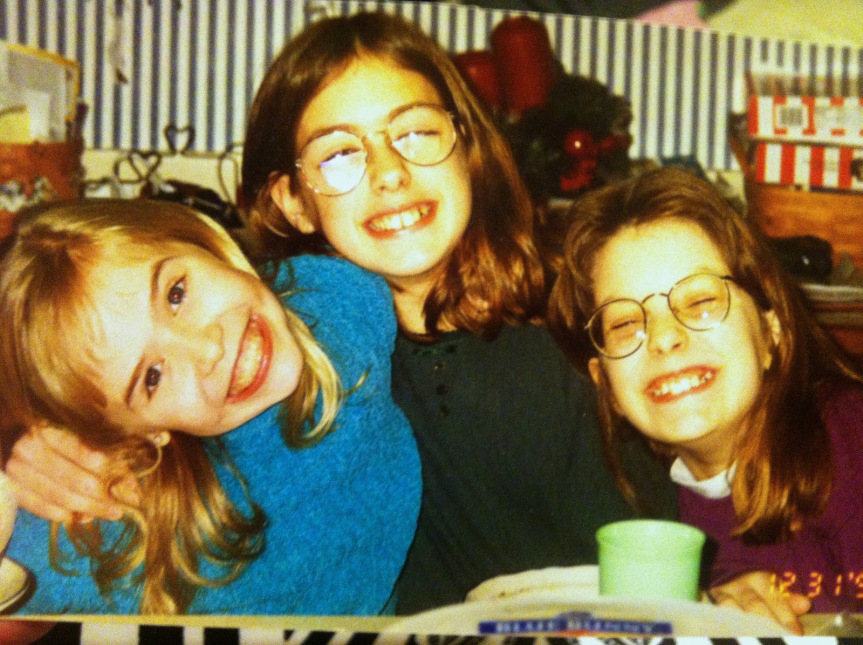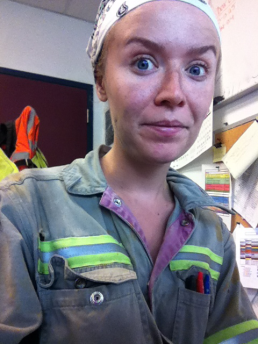Your Research. Your Life. Your Story.
A magnetic community of researchers bound by their stories
Every researcher has a story. What’s yours?
Science is suddenly fun again, post our ugly breakup

My name is Chelsea. I have known Meridith since I moved to Kentucky in 1996. That was 19 year ago! Before anything else, I would like to use this post as a forum to show some funny pictures of us together, and then, I will talk about science.

Photographic evidence of Meridith and Chelsea’s especially long friendship. Taken at Meridith’s house in 1997.
Glad I got that out of the way. Next, I want to share my story of taking a break from my relationship with science to find what matters to me. I am writing this for those who might be feeling burnt out or unsure about their path. In all stages of life, these are completely normal feelings.
I am an American living in Japan, where I work as an assistant language teacher (ALT) for the Japanese Exchange & Teaching (JET) program. In Japan, I teach English to freshman high school students. But it was not always this way; I used to be a geologist.
In 2009, I graduated with my B.S. in geology from Western Kentucky University. That year, I moved to Albuquerque, NM where I began my M.S. in geochemistry at the University of New Mexico. I hit the ground running in graduate school with an M.S. research project that was big and s**y, and would bring a major elaboration on something that very few groups had managed to achieve (foreshadowing). My proposal involved locating nanoscale grains of stardust from ancient, long-dead stars, locked away in meteorites on Earth.
Sadly, my original M.S. project was a big, s**y dud. I spent almost a year and a half failing at isolating stardust grains and generally not knowing what to do about it. The failures were not my fault, but I internalized and agonized over every one of them. At the time, I didn’t realize how common failed projects were, and that science wouldn’t quite work without the failures! However, it felt like every day I trudged wearily into the dark lab, put in my time, and got nothing in return. I was at a motivation low and the stars were just not with me (quite literally, it seems). Finally, I had the conversation with my adviser that it was time to cut our losses.
We salvaged the materials that we could and spun the thesis on a different axis, and I still managed to scrape together an M.S. worthy project from the dust (not stardust) of the original project. I graduated from a two-year M.S. program in three years’ time.
In 2012, with a freshly conferred M.S. degree and little regard for what actually made me tick, I began slinging resumes into the black hole of internet job posts. I aimed for anything labeled, “junior geologist” or “geologist I.” Through fluke and recommendation, I landed a job with a uranium mining company in Albuquerque as a staff geologist, even though I had never before considered mining as a career. After my first month, I discovered that my opportunities for projects and professional growth in that company were limited. Disappointingly, I garnered from tacit clues that the short ceiling was due to my gender. In fact, once an aging male superior spent 20 minutes imploring me to bring proper footwear into the field, as if I were going to go clip-clopping around abandoned mine sites while wearing stilettos because I was young and female… I only lasted 9 months before I found another job.

A photo of me at my job as a mining geologist in Nevada.
My next job, still in mining, brought me to work for one of the world’s largest gold producers. Impatient for the next step in the progression of things I felt I was supposed to be doing, I signed on. Suddenly, I was 2000 feet underground every day, in a stifling hot, bustling mine. I was bursting at the seams with an eagerness to excel in this role, taking on extra duties and projects whenever possible. But this job, too, was disproportionately dominated by males. My knowledge and recommendations were frequently challenged, for perceivably no other reason than it was difficult to gain acceptance as a woman operating in a scientific capacity. I could never prove myself, as I was always asked to jump arbitrary hurdles that my male counterparts were never expected to clear.
I lasted two years in mining job number two.
I liked being a scientist, but I’ve got to say, it can be difficult lasting in the field as a woman. I was doing everything that I was supposed to do; I was in a good job with good benefits. Yet, my happiness and direction in life were very low.
Like the end of a bad relationship, I felt something changing inside of me. In the past, I had a clear vision of how science could be my vehicle for learning and change, but I no longer knew why I was doing what I was doing. I needed out, and, as this is a real break-up story and not a romcom, I had to save myself. I took out a piece of paper and wrote down the things that made me happy. This may sound childish, but it can be difficult to remember every day why you are doing what you are doing.
The biggest member of my happiness brainstorm was science; I have always loved concrete explanations of the natural world. Next was teaching. In graduate school, I taught an intro geology lab that I adored. I later taught at the local aquarium as a docent. I loved the electrifying energy I felt when standing in front of a group of elementary students or a Girl Scouts troop, guiding them towards understanding the world around them. Also, on my list was the country of Japan. I had visited Japan in 2008 for a conference, and I was positively itching to return.
It may seem obvious, but it took me roughly 26 years to understand what to do next. I began to search for career opportunities that would incorporate all of the things I loved the most. I learned about the JET program, which allows foreigners with little Japanese ability to teach conversational English in Japanese K-12 schools. While admittedly light on science, JET gave me an avenue to combine my love for teaching with my love for Japan. In April 2014, I was accepted for a position in the rural Shimane prefecture. Leaving the comfort, security, and paycheck of my job in mining, I dropped everything and moved to Japan. This is one of the most difficult and rewarding things I have ever done.
Now, it’s February 2015, and it has been almost a year since I admitted to myself that I couldn’t envision myself in a scientific career for the rest of my life. Currently, I am happily living and working in Japan. I don’t make much money, I don’t speak very much Japanese yet, and this job is only guaranteed for one year at a time. But I am the happiest I have been in a long time. Intriguingly, science has worked its way back into my life. I now live in a country with a drastically declining birth rate, where women are feeling more pressure than ever to stay home and have babies. The UNESCO 2007 UIS database (UN statistics division) estimates that women make up just 25% of tertiary science enrolments at Japanese universities. Females in this country have very little encouragement to get involved in STEM fields, and Japan has the lowest number of registered female scientists out of any OECD country.
My past success in science places me squarely in an unintended science advocate role in my Japanese school. I am known among my local JET cohort as “the scientist,” and at school, even outside of classes, I often speak about science and career opportunities in science with my senior high school students and staff members. I have several science-minded community activities up my sleeve. Recently, I’ve had the opportunity to coach high-profile Japanese scientists in a nearby materials science laboratory about how to give the best scientific presentations in English. And, I’m having a blast.
It took extreme career upheaval and a trans-Pacific move, but science is suddenly fun again. Science and I did have a connection; it just wasn’t the one I was trying to force it to be. Our connection was embedded in one of the other things that make me most happy – education. I am enjoying my time in Japan so much that I signed on for a second year with JET, and when I get back to the US, I plan to begin my PhD in science education.
This story was published on February 5, 2015, on Rachel’s blog, ‘Sweet Tea Science’ (available here) and has been republished here with her permission.

Comments
You're looking to give wings to your academic career and publication journey. We like that!
Why don't we give you complete access! Create a free account and get unlimited access to all resources & a vibrant researcher community.

Your Research. Your Life. Your Story.
A magnetic community of researchers bound by their stories





